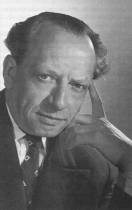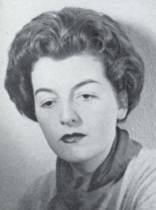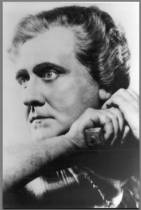
Leopold Ludwig Born: January 12, 1908 in Witkowitz, Moravia
Died: April 25, 1979 in Lüneburg, Germany
Leopold Ludwig was a leading Austrian conductor. Particularly well known as an opera conductor, he was also one of the first to make stereo LP recordings of symphonies of Gustav Mahler. He learned piano as a boy and continued to study the instrument at the Vienna Conservatory with Emil Pauer. He began his conducting career in the traditional German manner, working himself up through a number of coaching and then conducting positions in provincial opera houses in south Germany and in Brno, Czechoslovakia. He became the Music Director of the Oldenburg Staatsoper (State Opera) in 1936. Frequent guest conducting appearances in Berlin brought him to national attention, leading to his appointment as Principal Conductor of the Vienna Staatsoper in 1939. He became Principal Conductor of the Berlin Städtische Oper in 1943. After the war he continued in that position until 1951, and also frequently conducted at the Berlin Staatsoper. ("Städtische" means "Municipal"; the prefix "Staats-" means "State." The Berlin Städtische Oper is now the Deutsche Opera Berlin.) In 1950, Ludwig was appointed General Music Director of the Hamburg Staatsoper, effective 1951. This was the base for his expanding international reputation, and he remained there until 1971. He was an active and effective administrator, and improved its artistic and musical standards. In 1952, he took it on an important festival visit, to the Edinburgh Festival in the United Kingdom, beginning a practice of taking to major foreign venues and festivals. (Another of the company's most important overseas visits was to the Lincoln Center Festival in New York in 1967). He also modernized and broadened the company's repertory. He also made notable guest conducting appearances. He debuted in the United States at the San Francisco Opera in 1958, frequently returning there through 1968. He led the Glyndebourne (England) Festival Opera's first production of Richard Strauss' Der Rosenkavalier in 1959. He championed Paul Hindemith's opera Mathis der Maler in a series of performances in 1967, though a series of cuts he made in it were considered questionable. His first appearance with the Metropolitan Opera House in New York was in 1970, leading Wagner's Parsifal. He conducted in concerts with many leading orchestras. With the London Symphony Orchestra he made a pioneering recording of Mahler's Ninth Symphony, and conducted such leading orchestras as the Amsterdam Concertgebouw Orchestra. He was known for his calm platform demeanor and lack of flashiness. He was always praised for his competence and way with balancing orchestral sounds to make outstanding effects, though some detractors sometimes rated him as highly competent and sometimes less than inspired.

Gisela Litz
Born: December 14, 1922 - Hamburg, Germany
The German contralto, Gisela Litz, was trained in Hamburg.
Following her studies, Gisela Litz began her stage career at the Staatstheater of Wiesbaden. In 1952 she came to the Staatsoper of Hamburg, at which she had a long, successful career. She appeared there, among other things, in March 1954 in the premiere of the opera Die Heirat by B. Martinù. She achieved great successes with appearances in Munich, Rome, Lisbon, Brussels and Buenos Aires. In 1952 she appeared with the Hamburg ensemble as a guest at the Festival of Edinburgh in Igor Stravinsky’s opera Mavra. In 1953-1954 she appeared at the Festival of Bayreuth as Siegrune and as Floßhilde in Nibelungenring and as Knappen in Parsifal.
Gisela Litz made also a name for herself by her participation in operettas and in television performances. She had at the same time an important career as oratorio, and here particularly as a Bach singer. In 1969 Gisela Litz was appointed as Professor at the Musikhochschule of Hamburg.

Ludwig Suthaus (December 12, 1906 – September 7, 1971) was a German opera singer ("Heldentenor"), who was born in Cologne and died in West Berlin. Ludwig Suthaus was a stonemason's apprentice when his singing talents were first discovered. He subsequently started his voice studies at the age of 17 in his hometown of Cologne. His teacher, Julius Lenz, originally mistook him for a baritone, but in 1928 Suthaus debuted as a tenor in Aachen in the role of Walther von Stolzing in Richard Wagner's Die Meistersinger von Nürnberg. From 1932 to 1941, he was engaged in Stuttgart, but was fired in 1942 because he would not join the Nazi party. Suthaus subsequently got a new contract at the Berlin State Opera, the management of which didn't seem to mind the missing party membership. After the war, in 1949, he switched from the State Opera - now based in East Berlin - to the "Städtische Oper" which was based in West Berlin, and remained a member of that company until the end of his career.
Since the end of the forties Suthaus appeared regularly at the Vienna State Opera and as guest at the Royal Opera House Covent Garden, London, La Scala, Milan, in Paris, Stuttgart, the Bavarian State Opera in Munich, in San Francisco and at Hamburg State Opera. Beginning in 1943, he regularly appeared at the Bayreuth Festival where he sang Loge in "Das Rheingold", Siegmund in Die Walküre and Walther von Stolzing in Die Meistersinger von Nürnberg, which was recorded (1943), Hermann Abendroth conducting. Suthaus was one of Wilhelm Furtwängler's favorite singers toward the end of his life. With Furtwängler, Suthaus recorded Tristan und Isolde (1952); Der Ring des Nibelungen as Siegfried (1953); and Die Walküre as Siegmund (1954) (Furtwängler's last opera recording). He had to quit his career suddenly after a car accident, and died at only 64 years.
Ludwig van Beethoven
Symphony no 9 in D minor, Op. 125 "Choral"
Gisela Litz, contralto
Marlies Siemeling, soprano
Ludwig Suthaus, tenor
Ernst Wiemann, bass
Chor der St. Hedwigs-Kathedrale
Berliner Symphoniker
Leopold Ludwig
| 
